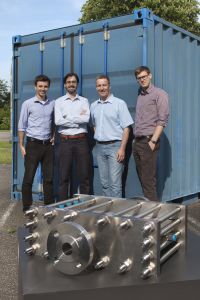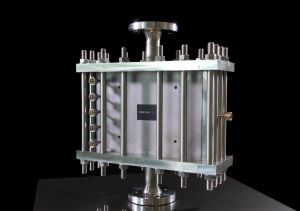Apart from teaching and research, innovation is one of the three core tasks of KIT. Consequently, technology transfer from fundamental research to trendsetting products is supported with adequate tools. Now, KIT has decided to participate as a partner in INERATEC GmbH. KIT will invest in this innovative spinoff that may revolutionize chemical process engineering and contribute to the success of the energiewende in the area of chemical energy storage systems.
The core of the new technology is a microstructured chemical reactor developed by KIT’s Institute for Micro Process Engineering (IMVT). INERATEC has developed this technology further to a marketable compact chemical facility. It is the first facility of this type that can convert small and medium volumes of methane-containing gases from fossil or renewable sources or waste gas from oil or biogas production into liquid synthetic fuel of highest quality, e.g. petrol, diesel, and kerosene. The facility can also be used to convert regenerative hydrogen and the greenhouse gas carbon dioxide into fuels. The turnkey facilities commercialized by INERATEC are mobile and fit into a conventional ship container.
“We supply an entirely new, modular technology that is a real alternative to the costly large chemical facilities used for the conventional gas-to-liquid process,” Dr.-Ing. Tim Böltken explains. He is member of the team of four persons who founded the company. The compact facility is not only suited for use in large chemical companies and oil-processing industry, but also for decentralized production of biogas-to-liquid fuels at sewage treatment plants or energy-producing organic farmers, the chemical engineer points out.

The founders of INERATEC from left to right: Philipp Engelkamp, Paolo Piermartini, Peter Pfeifer, and Tim Böltken. (Photo: INERATEC) Boeltken
KIT supports the spinoff as co-partner. “Technology transfer at KIT is more than mere advising on funding,” emphasizes Dr. Jens Fahrenberg, Head of the Innovation Management Service Unit of KIT. Core tasks of KIT are not only research and education, but also supporting innovation beyond borders of individual institutions. Through KIT participation, promising KIT-developed technologies and business models having a clear transfer character, a good growth prognosis, and solid management know-how continue to have access to KIT’s technical infrastructure and assistance while the new company establishes itself on the market.
“Science institutions have to act in an increasingly entrepreneurial way,” Fahrenberg is convinced. This also includes a new culture of seizing exploitation opportunities and a certain willingness to take risks. The processes and methods required for professional participation management have already been established at KIT. Based on the three core tasks of KIT of research, teaching, and innovation, entrepreneurial acting is increasingly implanted into KIT’s DNA, in the opinion of Fahrenberg. He points out that the participation portfolio is planned to be further extended.
KIT’s innovation efforts build a bridge between scientific findings and their application for the benefit of society, economic prosperity, and the preservation of our natural basis of life. Innovation is propelled by the results from research and teaching. At the interface between science and industry, KIT contributes to societal benefit and added values. Long-term support of spinoffs that plan to establish themselves on the market with their trendsetting and promising products is an integral constituent of the technology transfer concept of KIT. INERATEC GmbH is one of currently seven spinoffs in which KIT is a partner.
In close partnership with society, KIT develops solutions for urgent challenges – from climate change, energy transition and sustainable use of natural resources to artificial intelligence, sovereignty and an aging population. As The University in the Helmholtz Association, KIT unites scientific excellence from insight to application-driven research under one roof – and is thus in a unique position to drive this transformation. As a University of Excellence, KIT offers its more than 10,000 employees and 22,800 students outstanding opportunities to shape a sustainable and resilient future. KIT – Science for Impact.

